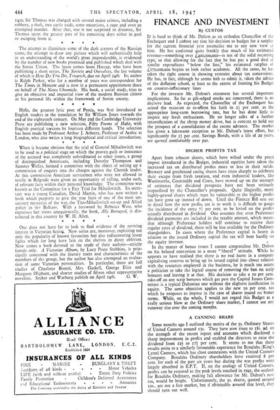FINANCE AND INVESTMENT
By CUSTOS IT is hard to think of Mr. Dalton as an orthodox Chancellor of the Exchequer and I calinot say that his decision to budget for a surplus for the current financial year reconciles me to any new view of him. He has confessed quite frankly that much of his estimated revenue—something over £400,000,000--is not of the solid recurring type,' so that allowing for the fact that he has put a good deal of similar expenditure " below the line," his estimated surplus of £270,000,000 begins to look rather academic. All the same, he has taken the right course in showing restraint about tax concessions. He has, in fact, although he seems loth to admit it, taken the advice of the deflation school, at least to the extent of framing his Budget on counter-inflationary lines
For the investor Mr. Dalton's statement has several important implications. So far as gilt-edged stocks are concerned, there is no decisive lead. As expected, the Chancellor of the Exchequer has seized the occasion to re-affirm his faith in Vi per cent. as the appropriate long-term borrowing rate, but he has done little to inspire any •fresh enthusiasm. He no longer talks of a further intensification of the cheap money drive, but is content to hold out the prospect of a consolidation of the recent advance. The market has given a lukewarm reception to Mr. Dalton's latest effort, but significantly the 21 per cent. Savings Bonds, with a life of 20 years, are quoted comfortably over par.
- HIGHER PROFITS TAX Apart from tobacco shares, which have wilted under the penal impost introduced in the Budget, industrial equities have taken the increased tax on distributed profits more or less in their stride. Brewery and greyhound racing shares have risen sharply to celebrate their escape from fresh taxation, and even industrial leaders, like Woolworths, Courtaulds and Coats, have moved up on the strength of estimates that dividend prospects have not been seriously jeopardised by the Chancellor's proposals. Quite illogically, many highly-geared shares which must be vulnerable to the higher profits tax have gone up instead of down. Until the Finance Bill sets out in detail how the new profits tax is to work it is difficult to gauge the incidence of the extra 74 per cent. to be levied on the profits actually distributed in dividend. One assumes that even Preference dividend payments are included in the taxable amount, which means that although Preference holders will continue to receive their regular rates of dividend, there will be less available for the Ordinary shareholders. In cases where the Preference capital is heavy in relation to the issued Ordinary capital the tax will bear hardly on the equity investor.
In the matter of bonus issues I cannot congratulate Mr. Dalton on his belated conversion to a more " liberal" attitude. While he appears to have realised that there is no real harm in a company capitalising reserves to bring up its issued capital into closer relation with the resources employed in the business, he is much too astute a politician to take the logical course of removing the ban on scrip bonuses and leaving it at that. His decision to take a to per cent. rake-off on any scrip bonuses which get past the Capital Issues Com- mittee is a typical Daltonian one without the slightest justification in equity. The same objection applies to the new to per cent, tax which he proposes to impose in the case of shares issued on bonus terms. While, on the whole, I would not regard this Budget as a really serious blow at the Ordinary share market, I cannot see any runaway rise over the coming months.
A CANNING SHARE
Some months ago I outlined the merits of the 5s. Ordinary Shares of United Canners around 13s. They have now risen to 18s. 9d. on the strength of the recent report and accounts which disclosed a sharp improvement in profits and enabled the directors to raise the dividend from 121 to I71 per cent. It seems to me that these results point to a similarly favourable experience for Beaulahs (King's Lynn) Canners, which has close connexions with the United Canners Company. Beaulahs Ordinary shareholders have received 8 per cent. for each of the past six years but during the war profits were largely absorbed in E.P.T. If, on the analogy of United Canners, profits can be restored to the peak levels touched ine1941, the outlook for Beaulahs Ordinary, making full allowance for Mr. Dalton's new tax, would be bright. Unfortunately, the 5s. shares, quoted around tos., are not a free market, but if obtainable around that level, they should turn out well.


































 Previous page
Previous page